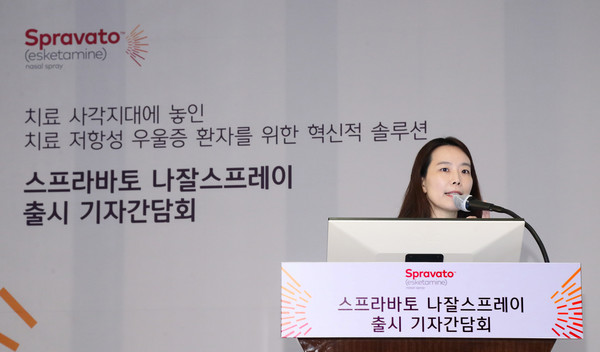Janssen Korea said that it has officially launched Spravato, a treatment-resistant depression drug, in Korea.
It is the first therapy for treatment-resistant depression and is also the first nasal spray drug in major depressive disorders, which uses a new mechanism for the first time in 30 years.

"The nasal spray formulation circulates rapidly throughout the body and is metabolized in the liver, preventing the problem of reducing drug efficacy in the course of drug activity," Janssen Korea Senior Vice President Go Min-jeong said during a news conference celebrating the launch of Spravato.
It also has the advantage of being non-invasive rather than an intravenous injection, Go added.
The company confirmed the efficacy of Spravato in a short- and long-term phase 3 clinical trial conducted on 1,700 patients with treatment-resistant depression.
Short-term clinical trial TRD (Treatment-Resistant Depression) 3002 divided 223 patients with treatment-resistant depression aged 18 to 65 years of age, and administered either Spravato and oral antidepressant group (114 patients) or placebo and oral antidepressant group (109 patients).
The results showed that the effect of improving treatment-resistant depression was excellent in the Spravato group compared to the placebo group. Particularly, the Montgomery-Asberg Depression Rating Scale (MADRS) score was significantly lowered (19.8 points vs. 15.8 points).
In the long-term trial TRD3003 in 705 patients, the recurrence probability in the Spravato group was also 51 percent lower than that of the placebo group.
Treatment-resistant depression refers to a case in which a patient's major depression symptoms do not improve even after taking two or more antidepressants. The disease accounts for one-third of depressed patients and shortens life expectancy by about 10 years.
Esketamine, a component of Spravato, modulates the activity of glutamic acid receptors called NMDA (N-methyl-D-aspartate) receptors in the brain to restore neuronal connectivity and increase neurotrophic signal transmission to improve depression.
As the drug is in the form of a nasal spray, it delivers the drug faster than tablets and less affects the liver or kidney.
During the conference, Professor Lee Sang-yeol at Wonkwang University Hospital stressed the importance of setting up early strategies for treating depression.
"Depressed patients who do not respond appropriately to existing drugs develop negative emotional conditions such as frustration, despair, and fear," Lee said. "In this case, changing to a new treatment option with a different mechanism at an early stage will help improve the patient's quality of life, rather than continuing with the existing medication."
Professor Lee expressed his disappointment with government policy.
"The healthcare policy is extremely biased toward cancer and cerebrovascular disease," Lee said. "Depression, a disease with the greatest social and economic burden, requires policy consideration. The sooner the treatment is started, the better the prognosis is."

